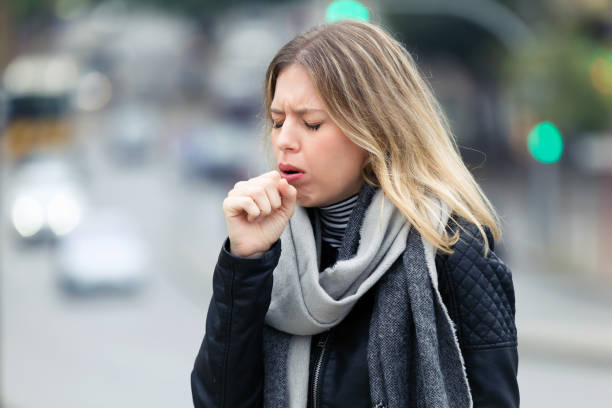WHAT IS COUGH?
Coughing is a voluntary or involuntary mechanism that clears your throat and airways of mucus or foreign irritants. While everyone coughs to clear their throat from time to time, some conditions can cause a more frequent cough.
There are different types as acute, subacute or chronic. Coughs lasting less than 3 weeks are classified as acute, coughs lasting 3 to 8 weeks and recovering at the end of this period are subacute, and persistent coughs lasting longer than 8 weeks are classified as chronic. Most coughing episodes resolve within two weeks, or at least significantly improve.
Phlegm cough is generally a type of cough that produces phlegm. If there is blood in the sputum that comes during coughing, it can be called bloody cough, or hemoptysis. Dry cough, on the other hand, is a very irritating type without phlegm. It is especially seen in viral diseases. An allergic cough is a type of cough that results from the immune system's response to an allergen rather than an infection such as the flu or cold. Night cough is a type of cough that occurs especially close to sleep and can affect a person's sleep pattern.
Continuing cough for a long time can cause negative consequences such as causing sore throat and hoarseness, causing insomnia, causing chest pain, making it difficult to eat and drink, creating psychological discomfort, and can reduce your energy for daily activities.

WHY DOES COUGH OCCUR?
A variety of conditions can cause coughing, both temporary and permanent. In order to be able to distinguish between them correctly, it is important to correctly note the duration, type and characteristics of the cough, as well as any other symptoms that go with it.
It is usually caused by viruses and will heal on its own without treatment. Different reasons play a role in the formation of acute or chronic cough.
Acute cough is usually caused by upper or lower respiratory tract infections such as flu, cold, bronchitis, pneumonia, pharyngitis, whooping cough, acute sinusitis, spring allergy. Apart from these, situations such as inhaling irritants and exposure to irritants such as certain vapors, fumes and gases can also cause an acute cough.
Tobacco use is one of the leading causes of chronic cough. Some other reasons are:
WHAT ARE THE SYMPTOMS OF COUGH
COUGH PREVENTION
Here's what you can do to prevent coughing before it happens:
HOW TO HEAL COUGH?
Cough can be treated in a number of ways, depending on the cause. Your doctor may apply the following types of treatment:
What you can do at home:

A Natural Supplement: Medicinal and Aromatic Plants’ Oils
There is increasing interest in the pharmacological properties of essential oils as an alternative method of support for respiratory ailments and infections. Because research has shown that the excessive use of some drugs causes side effects such as liver damage, ulcers, kidney problems and high blood pressure. Many people now use essential oils as a more natural supplement, before reaching for prescription or over-the-counter medications as the first response to coughing.
If you are considering using essential oils to relieve your cough, you should pay attention that the oil has the following characteristics:
Inhalation: You can use these essential oils individually or in combination for relief of cough symptoms. Inhaling the vapor of the oils allows it to reach the nasal passages and respiratory tract.
Fill a large bowl (500 ml) with hot water (not boiling water). Add 2-3 drops to hot water. Cover your head and the bowl with a cheesecloth so that the steam does not disperse. Close your eyes to avoid irritation and breathe deeply for 5-10 minutes. You can apply it many times a day.
By dripping 6-10 drops into the water in your censer or electric diffuser, you can spread the scent. The diffuser should be open for 30-60 minutes, then the environment should be ventilated for 30-60 minutes.
Massage: You can use these essential oils individually or as a mixture to relieve cough symptoms by diluting them with carrier oils at the appropriate rate. You can drip 2 - 3 drops into 15 ml (1 tablespoon) of carrier oil and mix them, and apply enough oil to your neck, chest and back area by massaging. You can use oils such as jojoba, black cumin, nioli as a carrier oil.
We recommended that you consult your doctor before using these herbal oils.
Consulting Your Doctor
Most coughs resolve within two weeks, or at least improve significantly. If you have a cough that does not improve during this time, we recommend seeing a doctor as it could be a sign of a more serious problem.
In most cases, no serious underlying disease is detected in cough. However, in rare cases, a prolonged cough may be a sign of a more serious illness that requires immediate treatment, such as heart failure. In the following cases, it is useful to have further examinations:
